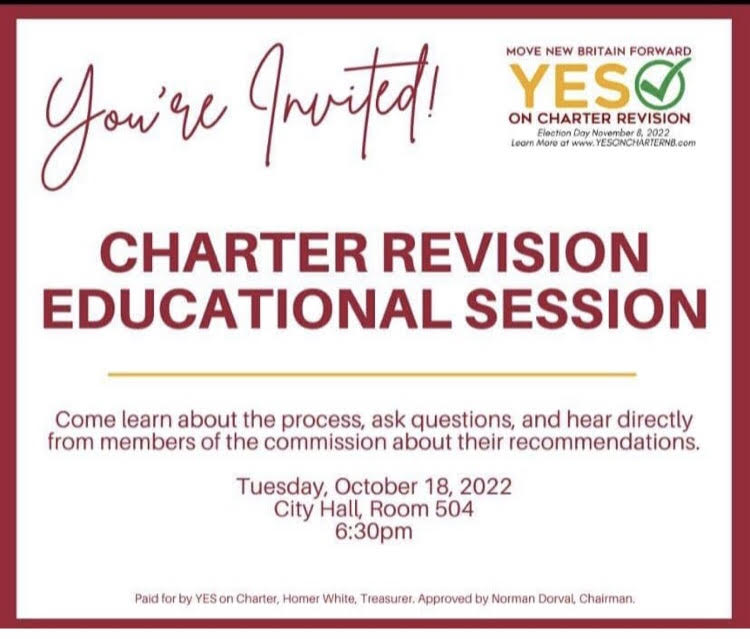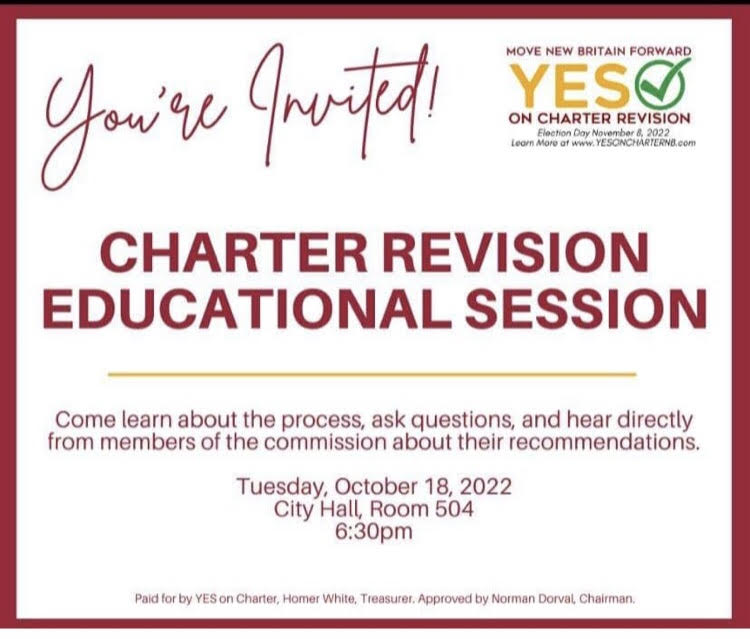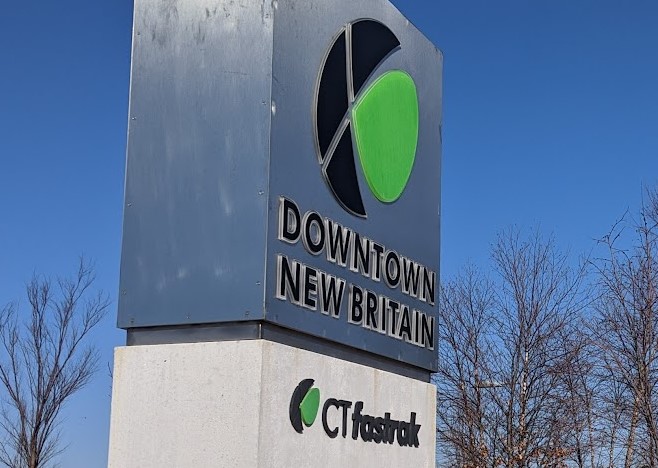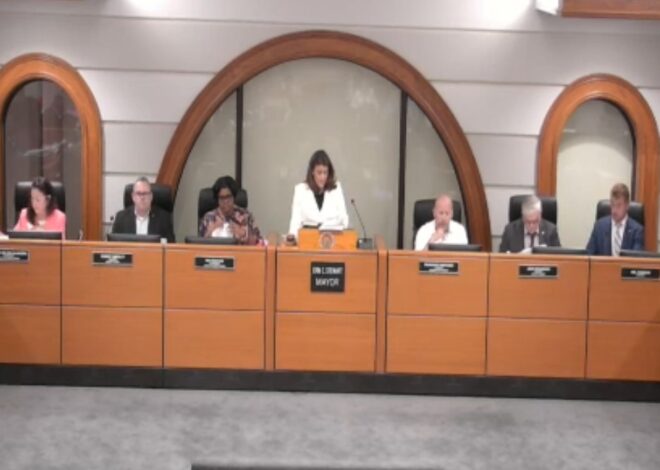Yes Committee To Hold Tuesday (10/18) Session To Promote Referenda
by John McNamara
NEW BRITAIN – The Yes on Charter Revision Referendum Committee will hold an “educational session” on October 18th featuring members of the charter commission to promote passage of amendments that have far-reaching implications as to how city government will be governed. Tuesday’s session will be held in Room 504 at City Hall, 27 West Main Street, at 6:30 p.m.

Heading into the final stretch of the 2022 campaign, pros and cons are being raised in letters to the editor and campaign literature with absentee voting already underway. Mayor Stewart has been pushing approval in her monthly opinion column in the New Britain Herald. The New Britain League of Women Voters (NBLWV) has been circulating a fact sheet on referenda to appear on the ballot at its voter registration sessions. The New Britain Democratic Town Committee adopted a resolution opposing charter changes.
There are three questions on the November 8th ballot in New Britain.
Question 1 is a statewide referendum on a constitutional change to permit early voting in Connecticut, one of only four states that does not allow voting ahead of election day now. It appears to have broad-based support except for factions in the Republican Party who push the need for “election security” and oppose voter access reforms.
Questions 2 and 3 pertain to the City Charter amendments. In June, the Common Council condensed the separate recommendations into two questions, ignoring specific questions contained in the commission’s report.
Question 2 asks that at large (citywide) representation on the 15-member Common Council end to be replaced by three councilors to be elected under the minority representation law in five wards (council districts). Currently, five council members are elected at large and 10 are elected in the wards. The current hybrid make up of the Council was created after charter changes re-establishing ward representation that was led by Democrats.
Question 3 asks that the remainder of the changes be adopted including the proposed chief administrative officer to perform mayoral duties in January 2023 and appointing instead of electing the Tax Collector and Town and City Clerk in 2025. Another revision sensibly calls for a charter commission review every five years but it is lumped into the question with the more contentious changes.
Question 3 has led to objections from both proponents and opponents because it lumps major changes into a broad question that leaves out what voters are being asked to decide.
The Council adhered to Mayor Stewart’s wishes and eliminated the ballot questions proposed by the charter commission that included:
- Shall the positions of Revenue Collector and the Town and City Clerk be changed from elected to civil service, appointed positions?
- Shall an appointed Chief Operations Officer, who shall report directly to the Mayor, be responsible for the daily management of certain City functions?
- Shall the remainder of the changes to the Charter as recommended by the Charter Revision Commission be approved, which changes include a provision requiring periodic Charter review every five years at a minimum?
All of those questions haven been incorporated into “Shall the remainder of the changes to the City Charter, as recommended by the Charter Revision Commission, be approved?” Yes or No”. The rationale for consolidating questions is purportedly to keep all questions on a one-sided ballot.
Don DeFronzo, a former mayor, state senator and state DAS commissioner, called the wording of Question 3 “disrespectful, patronizing, and perhaps deceitful, in dealing with New Britain voters” in a September 26th Opinion published in the New Britain Herald.

DeFronzo wrote that Question 3 is “generic, non-specific” and “poorly worded question with no informational context.” He also disagreed with the amendment for a new chief administrative officer: “While not disputing the need for strong professional management, many students of public administration would see the retention of both a full-time mayor and a high-salaried COO as a duplicative expenditure, leading to more bureaucracy and a fragmentation of authority.” The charter change will retain both a full time Mayor with a current salary of $100,000 and, if approved, bring on as of next January a city manager (COO) with a likely salary well over $100,000. The appointment of a tax collector and town clerk would not take effect until 2025.
In an October 6th Herald letter to the editor, John Board, who has served as a city commissioner in the Stewart administration, urged a yes vote to “help New Britain adopt 21st-century public administration best practices.” Board, however, acknowledged transparency problems with a “catchall” Question 2: “A lot of the recent chatter I’ve heard around town has been related to the process of how the final questions are structured and presented — those discussions absolutely have merit. Personally, Treasurer Danny Salerno’s approach of considering that question two be separated into a third question or more detailed provided would have given the greatest level of transparency for voters.”
State law (Sec.9-369b) requires the Town and City Clerk to print and disseminate “concise explanatory texts or other printed material with respect to local proposals or questions approved for submission to the electors at a referendum.” Each explanatory text, says state law, shall specify the intent and purpose of each proposal or question. In the July 19th New Britain Herald the Town and City Clerk, in apparent conformance with the law, published the charter amendments and strike throughs (deletions) in a small-type, two-page spread without any “concise explanatory texts.”
Officials have made assurances that prior to November 8th the public will be officially informed about the content of all the charter changes with explanatory literature for voters at the polls and in public notices.




